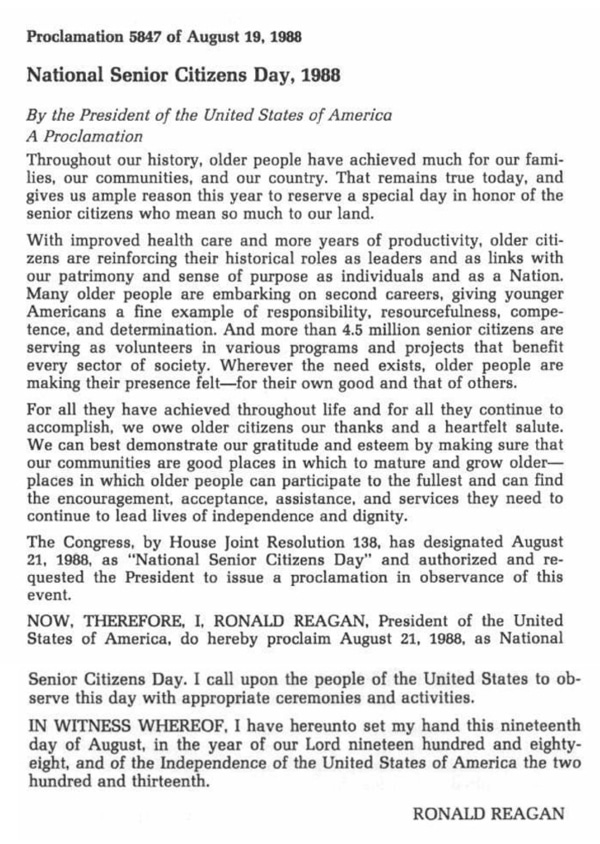National Senior Citizens Day: A Time to Honor, Act, and Prepare

You may not think much about aging until one day, you see it in the mirror. That’s what National Senior Citizens Day is about. It’s not just about older people—it’s about your story too.
Celebrated each Aug. 21, the day honors the wisdom, work, and resilience of seniors. It also nudges you to consider how prepared you—and your family—are for the road ahead.
Honoring a Lifetime of Service
President Ronald Reagan officially established National Senior Citizens Day in 1988 to recognize the elderly and their enduring impact across society.

The observance, held annually on Aug. 21, highlights their contributions to families, communities, and the nation while urging others to acknowledge that influence with respect and support.
With improved health care and more years of productivity, older citizens are reinforcing their historical roles as leaders and as links with our patrimony and sense of purpose as individuals and as a Nation. Many older people are embarking on second careers, giving younger Americans a fine example of responsibility, resourcefulness, competence, and determination. Wherever the need exists, older people are making their presence felt -- for their own good and that of others. — President Ronald Reagan in 1988.
The day also invites engagement—through mentorship, civic involvement, or social services—that keeps seniors active and connected. It shines a spotlight on pressing needs: caregiving burdens, long-term care planning, and equitable access to resources. The message is clear: experience and wisdom still matter.
Setting the Stage for a Demographic Shift
America is entering what experts call a “silver wave.” Every day, thousands of baby boomers reach retirement age, reshaping the nation’s social, economic, and healthcare landscape.
According to the U.S. Census Bureau and Pew Research Center, this unprecedented growth in the senior population isn’t a distant forecast — it’s happening now. Understanding the scale of this shift helps explain why planning, policy, and preparation matter more than ever.
- In 2025, an average of 11,400 Americans a day will turn 65—totaling about 4.18 million over the year, marking a historic peak in the aging of America’s population.
- The number of U.S. residents aged 65 and older reached approximately 61.2 million, comprising 18% of the population as of 2024.
These figures reflect a demographic shift with broad implications—for families, healthcare, finance, and public policy.
Recognizing Lifelong Contributions
Older adults make up more than 17 percent of the U.S. population. Many continue to volunteer, mentor, or care for family, long after retirement. National Senior Citizens Day encourages us to honor those ongoing impacts.
Local events—picnics, storytelling gatherings, health fairs—bring generations together and remind us that older adults remain vital contributors.
Too often, we define older adults only by their needs. But their contributions—economic, cultural, and familial—are immense.
The Realities of Aging You Can’t Ignore
There’s joy—and cost—in growing older. Many seniors later require help with daily activities such as bathing, eating, or managing dementia. Healthcare, home care, and assisted living all add up fast.
Older adults are stuck in a health care system that is not responsive to their goals and preferences. Boomers want health care that maximizes their health and ability to function, and they want their providers to listen to them. — Terry Fulmer, president of The John A. Hartford Foundation.
Without proper planning, these long-term care expenses can quickly deplete savings and place intense pressure on family caregivers. Often, when Long-Term Care Insurance is not available, a family crisis creates choices and economic uncertainty.
Ways to Show Appreciation — Every Day
Honoring seniors shouldn't be a once-a-year gesture. Here’s how you can make meaningful, everyday connections:
- Listen to their stories. Capture family history and affirm their life experiences.
- Encourage inclusion. Welcome them into decisions—family or community.
- Offer help. Assist with errands, appointments, or tech challenges.
- Promote involvement. Invite them to social events or volunteer opportunities.
- Advocate for change. Support policies that expand affordable care, caregiver support, and age-friendly infrastructure.
Even small actions send a powerful message: you see them, you value them.
Preparing Today, Not in Crisis
Celebrate and plan. That’s the dual call of National Senior Citizens Day.
- Explore Long-Term Care Insurance. While most people obtain long-term care coverage before they retire, from the ages of 47 to 67, affordable options are still available for older adults. An LTC policy will provide financial relief and broader care choices in addition to easing family stress and burden.
- Talk openly. Knowing loved ones’ hopes for aging brings peace of mind. Conversation is key.
- Use reliable tools. Resources like the LTC News Cost of Care Calculator and Caregiver Directory can guide decisions.
When we plan now, aging becomes less about burden and more about dignity.
A Day of Gratitude and Action
National Senior Citizens Day invites gratitude—and foresight. Honor elders by listening, supporting, and strengthening their independence.
If you are not yet a senior, remember that it will happen sooner than you think. Aging happens. You can honor your future self by planning for tomorrow’s reality.
One day, this recognition won’t be about someone else ... it’ll be about you.


